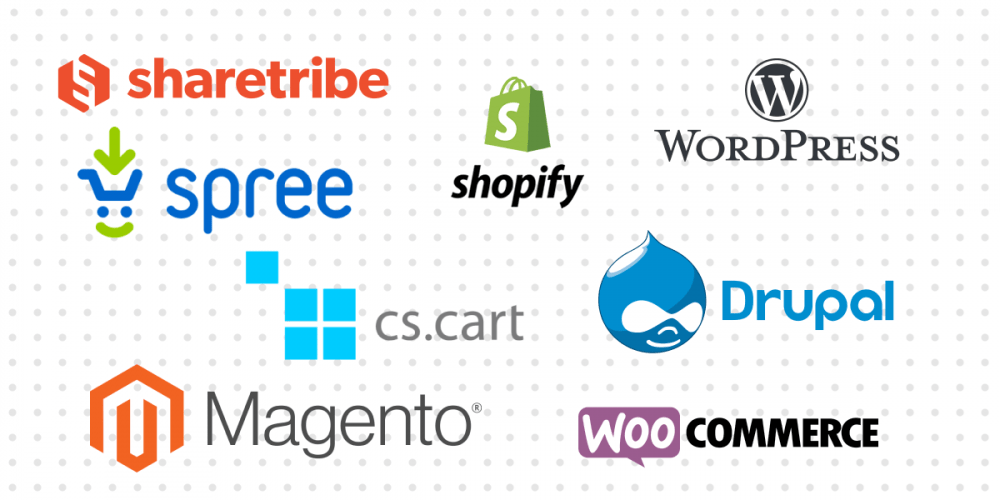Marketplace’s main goal nowadays is not just to connect buyers and sellers and enable the transaction between them. It’s also important to make this transaction of the best quality, offering the greatest pricing strategies as well as making every user happy. We do Ruby on Rails marketplace development every day, so we’d like to share with you what we’ve learned. Best off-the-shelf solutions for various marketplaces might be a simpler way than developing an online shop from scratch. And while we work as with custom solutions so as with marketplace development platforms, depending on a project’s features and purposes, let’s take a look at off-the-shelf ones…
Why marketplaces are growing so popular and why do we need them?
The main reason marketplace businesses popularity so huge is that you don’t need to invent anything by yourself to run one. Just think, you can create a huge business without having to spend a lot of money to buy the initial inventory and taking on a lot of risks. But of course before you get involved in developing your marketplace, you should take some time to focus on three main questions: why, what and how. If you are going to build a small business with a small staff, you’d better focus on a smaller market. If you have some other plans and expect to get some money from venture capitalists, your market needs to be huge.
The purpose of the online marketplace is to grow customers loyalty by offering them a variety of different products. A company must use its expertise to make its marketplace successful and profitable.
We can point out some advantages of online marketplaces:
- Vendors can sell goods without setting up their own online store.
- It provides a flexible business opportunity with relatively low start-up costs
- Vendors are allowed to create and upload products
- The commission structures provide the marketplace with the piece of the action
- It offers a convenient way to compare prices and products from a single source
- good reputation causes the level of trust between the customer and the buyer
- they provide transparency, as everything is in an open environment
Bearing all this mind we’ve done many successful showcases of the online marketplace and all of them were different and had their own specifics and difficulties.
What is the easiest way to develop an online marketplace?
Most people use online marketplaces for the same reasons they buy other products:
- to get a cheaper price,
- convenience and
- better quality.
As global software development company, Syndicode gathered the most talented and dedicated engineers with a great experience. We have done tens of online marketplaces in different countries and industries and shared our experience of 3 options on how to build a marketplace. We don’t have one simple answer on how to create an online marketplace since the stages of development and budget usually depend on the specifics of the business. But there are general steps that comprise the creation of all trading platforms, including the search for a better platform, the creation of MVP and others.
When we’re talking about developing marketplace, there are many ways you can do it. And of course, there are some hidden features and processes that are very important for the platform to work properly. We can name some of them:
- track user activity and recommend related products
- create discounts and promotional offers to increase sales
- integrate the store with the chosen payment system
- make sure the online support works for 24 hours
- grow and improve the quality of your marketplace, update features, offer new products, invent something new.
- ensure security measures
- create great design
From the customer’s point of view, the marketplace offers a place where you can find everything you need at once: find all the providers from the same service and compare them. From the provider’s point of view, the marketplace brings them more clients. So everyone is happy. You just need to make it right.
Types of marketplaces and their examples
There is no doubt that knowing different types of marketplaces is important. That’s how you are able to know where to belong. A new project will have to fit into the existing categories. Let’s go through available types of marketplaces and find their meaning. Here the 8 types of online marketplaces:
- B2B – platform for transaction of products or services between businesses.
Example: Alibaba.
- mCommerce – platform for buying or selling of goods and services through wireless handheld devices.
Example: Uber.
- Crowdfunding – platform lets people post their projects and raise money for their execution through fundraising campaigns.
Example: Kickstarter.
- C2C – platform for transaction of products or services between customers.
Example: OLX or Blablacar.
- eCommerce – platform for two parties, e.g. seller – shopper, startup owner – investor, etc.
Example: Walmart.
- B2C – platform for transaction of products or services from business to customers.
Example: Amazon or Netflix.
- peer-to-peer – platform which brings together users, who offer products through offline services.
Example: Etsy.
- auction platforms – platform where a seller lists a product and sets a deadline; buyer with the highest bid gets the item.
Example: eBay.
We can also select such types of the marketplace by following thematic categories:
- Goods and Products (Etsy, eBay, AliExpress, Amazon).
- Services (Couchsurfing, Airbnb, Uber).
- Media (TravMedia IMM).
- Crowdfunding (Indiegogo, Kickstarter).
Maybe next time your company will be on our list?
Most famous off-the-shelf solutions to develop an online marketplace
An off-the-shelf platform is readymade software that can be installed right away. Usually, this is kind of software, that has already been used and tested by a number of other businesses. This is a generic software. There are plenty of marketplace open systems and platforms that are already created and you have to just use them for your own: Sharetribe, Mayocat, Spree, WordPress, Woocommerce, Near Me, Yo-Kart and Magento. And there are more and more Sharetribe alternatives that appear every year.
We highlighted the best:
- Sharetribe is an open source platform that let users build their own marketplaces. As all of such platforms do. But Sharetribe is a perfect solution for small businesses who want to launch in a short timeframe. Browse for Marketplaces built with Sharetribe: Quiver, Cycle.land. Getting deeply into the analysis we can tell that Sharetribe is focused more on creating peer-to-peer marketplaces rather than multi-vendor marketplaces with organized storefronts.
- Next open source in WordPress. It currently stands as one of the most enduring Contents Management System (CMS) on the Internet. In 2016, 26% of all websites globally used WordPress. It’s well-known and it’s interface became somehow a standard. When you work with WP limited amount of coding required. So it’s very popular among non-programmers. Anyway, in WP you have ready-made solutions which disable your own variants. It has other disadvantages too: WP needs plenty of plugins to be installed (and they influence the script efficiency not in a good way), It uses its own script, which is not protected as well as other applications, lack of stability guarantees.
- Spree is also an open-source ecommerce platform for building online storefronts. Spree has an active open-source development community that constantly maintains support for the latest version of Rails. It offers a user-friendly admin panel. But Spree is hard to customize to meet unique needs.
- Drupal is considered to be one of the best open-source platforms to build the CMS website. It is a platform where businesses can publish the content and sell their products without needing any technical knowledge. But keep in mind, using Drupal, building a full-fledged marketplace is not possible.
- CS-Cart Multi-vendor is a pack full of other packages that will help you build a marketplace. Creating it is possible without huge financial investments. It offers plenty of interesting tools for shoppers.
- If you develop your Marketplace in Shopify: Shopify apps can be developed with Ruby on Rails, Python, or any other coding language. Its gems help you to start if you’re developing your app with Ruby on Rails. You can get the gem, which contains sample code for an app using the Embedded App SDK, on Shopify’s Github page. But, as you can guess, the ready-made platform will not let you customize your marketplace.
- Magento Marketplace allows you to customize templates and to develop functionality according to your needs. And the community version is free for small to medium-sized businesses. Magento Enterprise costs $18,000 per year for enterprise business solution. But this Marketplace needs a dedicated server and normal hosting platforms cannot handle it. Even on having a flexible architecture, customization is hard to make because of its loading speed on different platforms.
- Woocommerce is the eCommerce plugin for WordPress which has been used and appreciated by 28% of the world’s online stores. Many of its extensions, themes and plugins are free to use and distribute and there are thousands of paid add-ons available for purchase. The main advantage of this platform is data safety and control. And the disadvantage is the need of expert developers as far as the frequency of WordPress updates is high and the plugins and extension cannot adapt very effectively to the pace. Customization might be expensive. Also, it doesn’t offer to host so you must get paid hosting and domain.
The main alternative – building an online marketplace from scratch
Nowadays Ruby on Rails marketplace development is a standard. The explanation is quite simple: speed, low cost, productivity, availability.
- Ruby on Rails reduces the time for development in 1.5-2 times – you can present your app on market 2 times faster!
- Ruby on Rails is free! You don’t need to pay anything for use.
- It’s perfect for CRM, CMS or e-commerce system – Ruby on Rails highly suitable for websites that require a lot of content input.
- Plenty of gems (libraries), so you don’t need to reinvent the wheel, just use it. Especially that matters when the deadline is ‘yesterday’ and the budget is super small.
Explore 8 famous online marketplaces developed with Ruby on Rails to understand why Rails is so popular for e-commerce products.
Syndicode gathered the most complete information about marketplaces, their types, examples, technologies, features and online marketplace development. We use this information to develop the best e-commerce solutions for your business regardless of its scale and type.
You can see our related projects and find a raw estimate for an online marketplace development cost.
Ignoring online marketing today is like writing a book without giving anybody a chance to read it. We can predict fast e-commerce development in the next few years. Syndicode collected online marketplace development trends that can help you improve the online shopping experience for your customers.
If you have an interesting project, don’t hesitate and hire developers in Syndicode!

